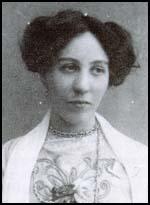Helen Kirkpatrick Watts

Helen Kirkpatrick Watts, the daughter of A. H. Watts, vicar of Lenton, was born in Sunderland in 1881.
Watts joined Women's Social and Political Union (WSPU) in December 1907 after hearing Christabel Pankhurst speak in Nottingham. It seems that she was not a very active member until she was arrested during a demonstration outside the House of Commons on 24th February 1909. When she was released the following month she was presented with bouquets in the suffragette colours and with illuminated scrolls designed by Sylvia Pankhurst to commemorate her imprisonment.
In September 1909 she was again arrested after taking part in a demonstration in Leicester outside a meeting being held by Winston Churchill. After going on hunger strike for 90 hours in Leicester Prison she was released. She later wrote in an article that women's suffrage "will not be won by drawing-room chatter... it has got to be fought for in the market-places, and if we don't fight for it, no-one else will."
Watts became a regular visitor to Eagle House at Batheaston, the home of Mary Blathwayt. Others who spent time at Blathwayt's house included Christabel Pankhurst, Jessie Kenney, Annie Kenney,Clara Codd, Clare Mordan, Elsie Howey, Constance Lytton and Vera Wentworth. Colonel Blathwayt photographed the women. These were then signed and sold at WSPU bazaars. He also invited them to plant a tree to commemorate their prison sentences and hunger strikes.
Although she often spoke at public meetings, Helen Watts was not arrested again until January 1910 when she took part in a demonstration outside a meeting being held in Nottingham by Herbert Samuel. On this occasion she was released without charge. According to Emily Blathwayt: "She (Helen Watts) is a nice girl, but difficult to talk with because besides being very deaf herself she speaks so that it is very difficult to understand her." On 17th March 1911, Colonel Linley Blathwayt planted a tree, a Juniperus Communis Fastigiata, in her honour in his suffragette arboretum in a field adjacent to the house.
In 1912 the WSPU began a campaign to destroy the contents of pillar-boxes. By December, the government claimed that over 5,000 letters had been damaged by the WSPU. In July 1913 attempts were made by suffragettes to burn down the houses of two members of the government who opposed women having the vote. These attempts failed but soon afterwards, a house being built for David Lloyd George, the Chancellor of the Exchequer, was badly damaged by suffragettes. This was followed by cricket pavilions, racecourse stands and golf clubhouses being set on fire. Watts disagreed with this arson campaign and resigned from the WSPU and joined the Women's Freedom League.
During the First World War she was a nurse at the Mineral Water Hospital in Bath. Later she worked in both the War Office and the Ministry of Labour. It is believed that she later emigrated to Canada.
In the early 1980s, documents relating to Helen Watts were lodged with the Nottingham Archive Office. The Helen Watts Archive contains 23 letters (dated 1900-14) to Helen or her family concerning her activism and 8 of her written speeches (dated 1909). It has subsequently been expanded with inclusion of articles from the Nottingham Evening News and Nottingham Guardian (1908-11).
Primary Sources
(1) Emily Blathwayt, diary entry (April, 1911)
Helen Watts is a nice girl, but difficult to talk with because besides being very deaf herself she speaks so that it is very difficult to understand her.
(2) The Suffrage Annual, and Women's Who's Who (1913) page 889
Watts, Miss Helen Kirepatrick. Society: W.S.P.U.; born 1881, at Sunderland ; daughter of the Rev. A. H. Watts; arrested for taking part in W.S.P.U. deputation from Caxton Hall to the House of Commons, February 24th, 1909; imprisoned in Holloway for one month; arrested for taking part in protest at Leicester, outside public meeting addressed by Mr. Winston Churchill; imprisoned in Leicester Gaol, September 4th-8th, 1909 ; hunger struck for 90 hours; arrested for taking part in protest at Nottingham outside public meeting addressed by Mr. Herbert Samuel, M.P., January, 1910; charge dismissed. Publications: ‘‘Poems by a Brother and Sister’ (jointly) (Saxton, 1906); and ‘‘ The Nevilles: a Story for Girls” (S.P.C.K.,1912). Address: Lenton Vicarage, Nottingham.

